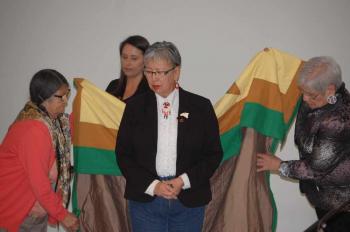Image Caption
Summary
By Shari Narine
Windspeaker Contributor
EDMONTON
Patience and belief, says Senator Lillian Dyck, are needed as the commission for the murdered and missing Indigenous women and girls national inquiry does the work required before it returns to talking to families and communities.
That was the message Dyck delivered April 27 at the University of Alberta.
Dyck said she was confident that despite the commission’s decision to postpone its regional advisory meetings just prior to its scheduled three days in Edmonton, that the work of the commission would come back stronger.
On April 13, the commission, led by Marion Buller, issued a statement saying it was postponing upcoming regional advisory meetings. It had had been told in Whitehorse that the meetings needed to be “reformulated (in a manner) that honours and reflects the people of their territories and is inclusive, accessible and focused.”
Regional advisory meetings had been scheduled in Edmonton and Thunder Bay for April 18 to April 20.
Since its appointment in late August 2016 by Prime Minister Justin Trudeau, the commission has been plagued with criticism for its slow progress and lack of communication.
But Dyck remains undeterred.
“(People) just have to be patient and that the Creator has a path and it is so hard (but) we need to trust that it will happen,” she said.
But as the commission stalls, Dyck continues her work, using her position in the Senate to fight for murdered and missing Indigenous women. She championed her bill, which she introduced in the senate in late 2015, and which is now in the House of Commons. Bill S-215 calls for stiffer penalties against those sentenced for violent offences against Indigenous women.
“I’ve tried my best to get someone there to take it forward so we change our laws to protect Aboriginal women.”
Dyck said she has worked “intensely” on the issue of murdered and missing Indigenous women and girls since she was appointed to the senate by then Prime Minister Paul Martin in 2005.
Her work was honoured Thursday evening when the University of Alberta wrapped her in a blanket.
“It is definitely going to help me, especially in my work in the senate, the work that I do on murdered and missing Aboriginal women and girls. It’s such important work and it is pushing against the odds and with tonight’s ceremony, I know it will come to fruition,” said a tearful Dyck.
Dyck is one of two Indigenous women senators and one of seven Indigenous senators, which includes former chair of the Truth and Reconciliation Commission, Murray Sinclair.

